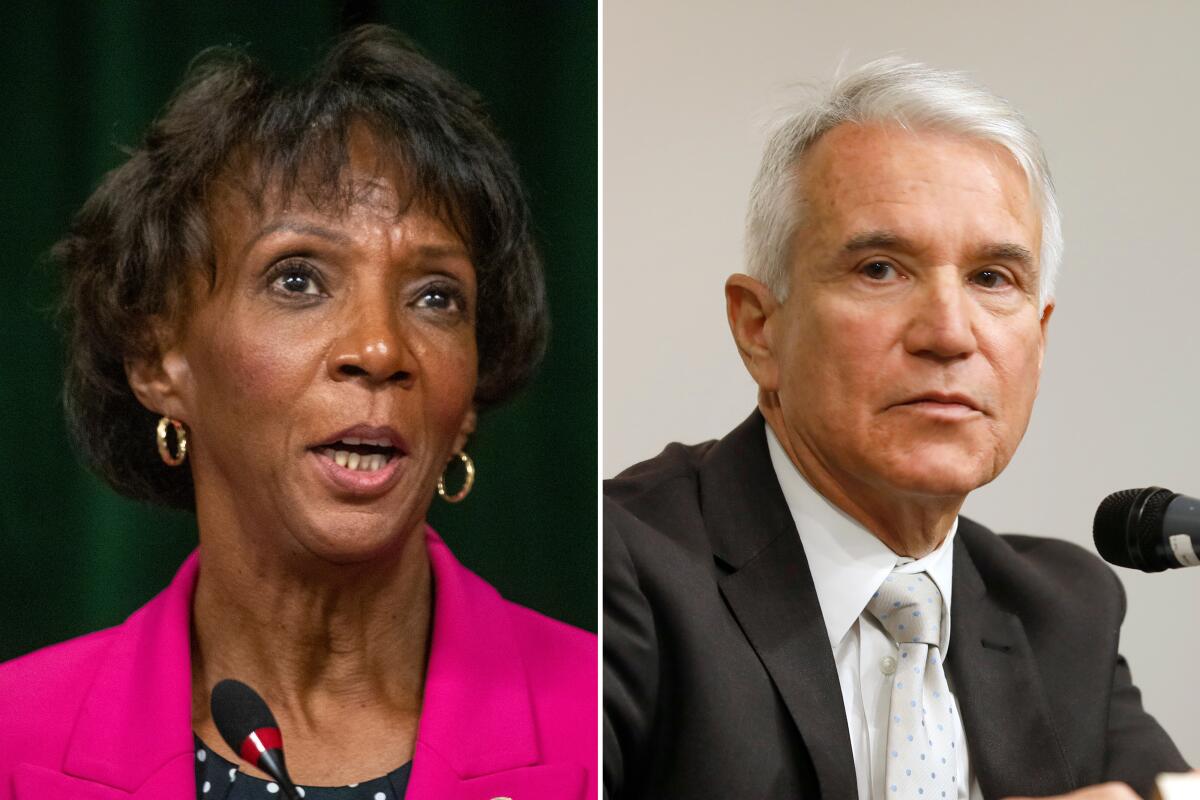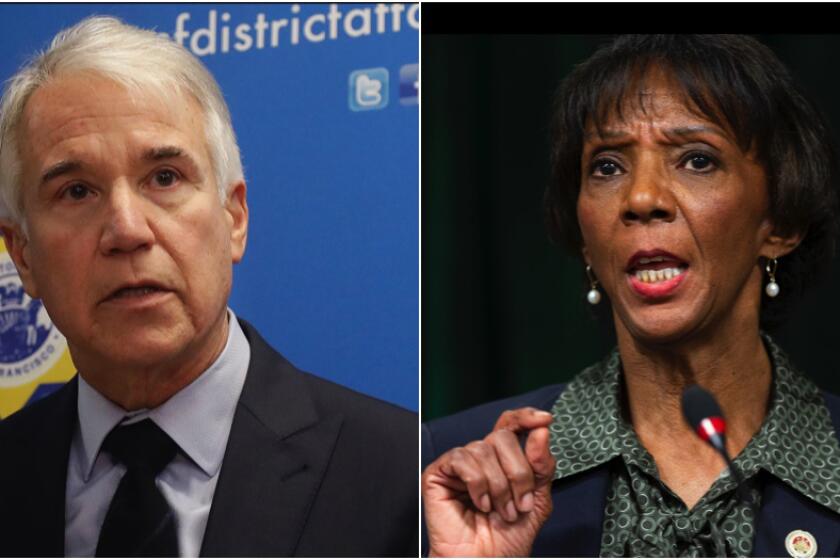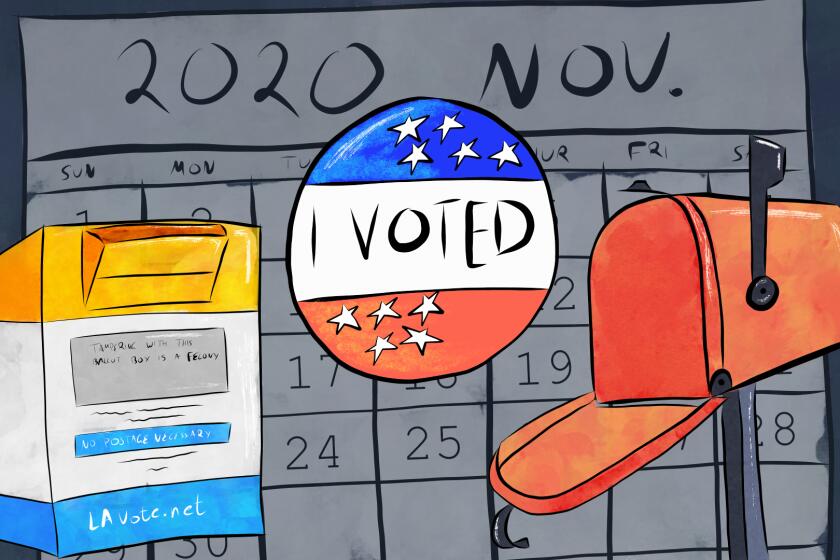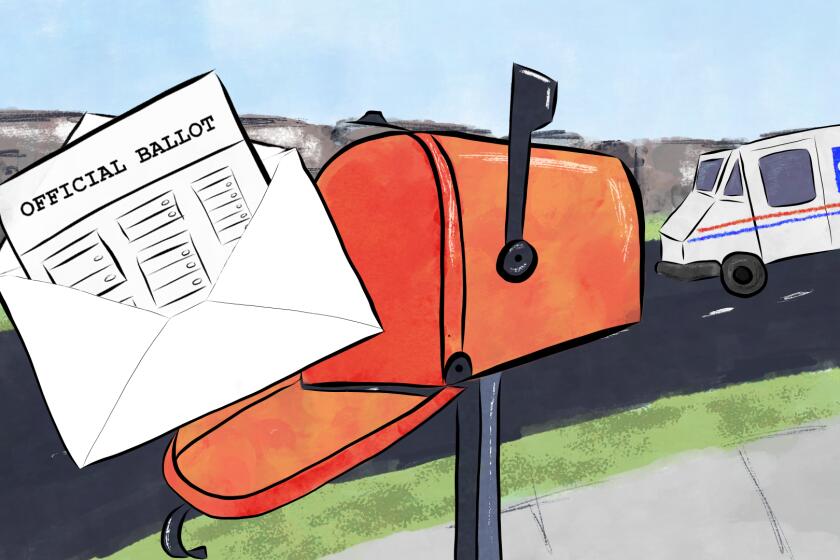As election winds down, Los Angeles D.A. candidates skirmish in virtual debate

With the race to lead the country’s largest prosecutor’s office entering its final stretch, the incumbent, Los Angeles County Dist. Atty. Jackie Lacey, squared off in a debate Thursday night with her progressive challenger, George Gascón, who is riding a swell in endorsements and fundraising after a tumultuous summer shifted political winds in Los Angeles.
The nationally watched contest comes against the backdrop of a burgeoning movement for criminal justice reform, prompted by the killing of George Floyd in police custody in Minneapolis and those of other people of color.
The November contest between Los Angeles County Dist. Atty. Jackie Lacey and former San Francisco Dist. Atty. George Gascón to oversee the nation’s largest prosecutor’s office has been framed as a test of appetites for criminal justice reform.
Lacey, a 34-year veteran of the office she now leads, was elected district attorney in 2012 and won a second term unopposed in 2016. She is the first woman and the first Black person to head the county prosecutor’s office in its 170-year history.
Gascón led the San Francisco district attorney’s office for eight years. He previously served as a top official with the Los Angeles Police Department and led the police departments of San Francisco and Mesa, Ariz.
In a virtual debate moderated by reporters from the Los Angeles Times and KPCC, Lacey and Gascón staked out positions far apart on capital punishment and gang enhancements.
“Until the voters tell me, ‘We don’t want this penalty anymore,’ we’re going to continue to seek it in some cases,” Lacey said, stressing that her deputies only pursue the death penalty in rare, egregious crimes.
Calling his opponent “out of touch with reality,” Gascón said capital punishment is no longer useful as a deterrent and is unequally applied to minority defendants, particularly when a victim is white.
If elected, Gascón said he would no longer seek gang enhancements, which can lengthen a defendant’s prison sentence if a jury finds the crime benefited a gang. Such enhancements have been “corrupted,” he said, citing the alleged falsification by six officers from the LAPD of field interview cards that erroneously labeled dozens of people as gang members and associates.
Lacey said she would continue pursuing the enhancements, emphasizing that a defendant’s association with a gang is proven not by the field interview card but through testimony and other evidence brought before a jury.
“He’s not a courtroom lawyer,” she said, accusing Gascón of dismissing victims of gang violence and “neighborhoods under siege.”
On other issues, such as diverting some defendants from prosecution or incarceration, both candidates expressed support for such programs but offered differing views on how they should look. Lacey touted her record of diversion programs for some mentally ill people but said more funding is needed for “secure housing” before expanding them.
“I do not believe a lot of these people could just be let out onto the street,” she said.
Gascón said that in San Francisco, his office successfully diverted people with nonviolent misdemeanor cases into settings where they could be rehabilitated. Lacey accused him of allowing property crime — particularly car break-ins — to spike under his watch, after he essentially discouraged police officers from investigating the crimes by choosing not to vigorously prosecute the perpetrators, she said.
Both Lacey and Gascón wielded different sets of facts, reaching for studies and statistics from different think tanks and universities to accuse the other of allowing crime to rise or of failing to address various social and managerial problems.
They clashed over how many police officers they had prosecuted and for what crimes; whether people killed by the police in their jurisdictions had been armed; whether legislation that downgraded certain felonies to misdemeanors has alleviated or worsened social issues.
But they appeared to agree on this: Lacey has an established track record that she has not shied away from. Gascón’s views have changed. From his time as a police officer, to being the top prosecutor in San Francisco, to seeking the same office in Los Angeles, he said he continues “to learn and evolve.”
Lacey offered a different assessment: “He says ‘evolve.’ That’s politics. Changing your views to get elected. Changing your views to get a new job.”
Lacey has the backing of law enforcement unions, which have contributed several million dollars to outside committees supporting her campaign. Gascón enjoys support from a group of progressive billionaires and millionaires, many of them in the Bay Area.
In recent weeks, several Southern California politicians have abandoned their endorsements of Lacey for Gascón, most notably Los Angeles Mayor Eric Garcetti, who issued a statement last week calling Gascón the candidate “who can meet this moment.”
More to Read
Sign up for Essential California
The most important California stories and recommendations in your inbox every morning.
You may occasionally receive promotional content from the Los Angeles Times.













